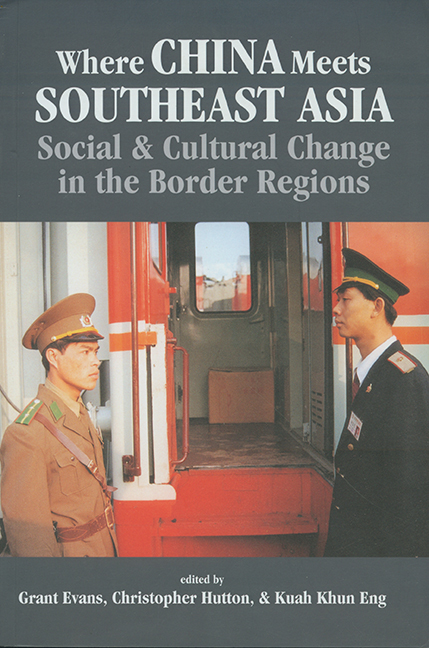Book contents
- Frontmatter
- Contents
- Contributors
- Map
- Introduction: The Disappearing Frontier?
- 1 Where Nothing Is as It Seems: Between Southeast China and Mainland Southeast Asia in the “Post-Socialist” Era
- 2 The Southern Chinese Borders in History
- 3 Ecology Without Borders
- 4 Negotiating Central, Provincial, and County Policies: Border Trading in South China
- 5 The Hmong of the Southeast Asia Massif: Their Recent History of Migration
- 6 Regional Trade in Northwestern Laos: An Initial Assessment of the Economic Quadrangle
- 7 Lue across Borders: Pilgrimage and the Muang Sing Reliquary in Northern Laos
- 8 Transformation of Jinghong, Xishuangbanna, PRC
- 9 The Hell of Good Intentions: Some Preliminary Thoughts on Opium in the Political Ecology of the Trade in Girls and Women
- 10 Cross-Border Mobility and Social Networks: Akha Caravan Traders
- 11 Cross-Border Links between Muslims in Yunnan and Northern Thailand: Identity and Economic Networks
- 12 Trade Activities of the Hoa along the Sino-Vietnamese Border
- 13 Cross-Border Categories: Ethnic Chinese and the Sino-Vietnamese Border at Mong Cai
- 14 Regional Development and Cross-Border Cultural Linkage: The Case of a Vietnamese Community in Guangxi, China
- 15 Women and Social Change along the Vietnam-Guangxi Border
- Index
12 - Trade Activities of the Hoa along the Sino-Vietnamese Border
Published online by Cambridge University Press: 21 October 2015
- Frontmatter
- Contents
- Contributors
- Map
- Introduction: The Disappearing Frontier?
- 1 Where Nothing Is as It Seems: Between Southeast China and Mainland Southeast Asia in the “Post-Socialist” Era
- 2 The Southern Chinese Borders in History
- 3 Ecology Without Borders
- 4 Negotiating Central, Provincial, and County Policies: Border Trading in South China
- 5 The Hmong of the Southeast Asia Massif: Their Recent History of Migration
- 6 Regional Trade in Northwestern Laos: An Initial Assessment of the Economic Quadrangle
- 7 Lue across Borders: Pilgrimage and the Muang Sing Reliquary in Northern Laos
- 8 Transformation of Jinghong, Xishuangbanna, PRC
- 9 The Hell of Good Intentions: Some Preliminary Thoughts on Opium in the Political Ecology of the Trade in Girls and Women
- 10 Cross-Border Mobility and Social Networks: Akha Caravan Traders
- 11 Cross-Border Links between Muslims in Yunnan and Northern Thailand: Identity and Economic Networks
- 12 Trade Activities of the Hoa along the Sino-Vietnamese Border
- 13 Cross-Border Categories: Ethnic Chinese and the Sino-Vietnamese Border at Mong Cai
- 14 Regional Development and Cross-Border Cultural Linkage: The Case of a Vietnamese Community in Guangxi, China
- 15 Women and Social Change along the Vietnam-Guangxi Border
- Index
Summary
Since the opening of the border at the end of the 1980s, diplomatic relations between Vietnam and China have improved and Sino-Vietnamese trade in the border regions has gained momentum. This chapter will explore how the Hoa (ethnic Chinese in Vietnam) use their social and economic networks to further their trading activities along the border. It will also discuss the reasons for their success.
The Hoa have many advantages in trading which other groups lack. Their main advantage is their networks, which have made it easier for them to mobilize capital and to gain access to the sources of goods, and to the transfer of technology. The strength of these networks has given the Hoa community a high degree of competitiveness in terms of capital, technology, prices, and product quality — not only in the border area but also throughout the country and elsewhere in Southeast Asia. This fact helps to explain why the Hoa have risen so rapidly, and why they have proved themselves to be among the region's top businesspeople.
THE HOA IN VIETNAM
The Hoa (nguoi Hoa) are the ethnic Chinese who have settled in Vietnam. They are one of the fifty-four ethnic groups, and are Vietnamese citizens with full citizenship rights. However, through their language and their customs they are distinguishable from the ethnic Vietnamese, the Kinh, and other ethnic groups. In towns and cities inhabited by the Hoa, they have established Chinese-language teaching centres, especially in the southern part of Vietnam. The Chinese language is also often taught in the families. They also observe Chinese customs and worship Chinese gods.
Besides the Hoa, there is also a small group called Hoa Kieu (literally “Overseas Chinese”) residing in Vietnam. They are citizens of China, Taiwan, Hong Kong, or Macau whose primary objective in Vietnam is trading and business.
The Hoa do not represent a large segment of the population. There are about 1 million Hoa, which is less than 1 per cent of Vietnam's total population of 75 million people.
- Type
- Chapter
- Information
- Where China Meets Southeast AsiaSocial and Cultural Change in the Border Regions, pp. 236 - 253Publisher: ISEAS–Yusof Ishak InstitutePrint publication year: 2000



